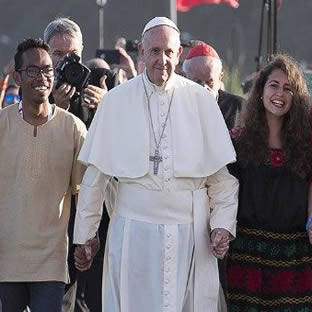Los tres consejos evangélicos muestran el camino hacia la conversión ecológica y hacia una vivencia equilibrada de las tres grandes pulsiones humanas: la brama del tener (pobreza), la ambición del poder (obediencia) y el deseo del valer (castidad). Estos consejos son válidos para todos los cristianos, laicos o religiosos, solteros o casados, pues todos están llamados a la perfección evangélica[1]. Quien los vive serenamente supera la concupiscencia, a todos los niveles, y es capaz de establecer relaciones gratuitas, oblativas y libres. Surge así una eco-espiritualidad que sana de raíz el consumismo del “usa y tira” y el narcisismo de quienes utilizan al prójimo sin sentirlo como hermano, a la vez que capacita para escuchar el grito de la tierra y el grito de los pobres. Pobreza para ser libres y hermanos El consejo evangélico de la pobreza mira a orientar adecuadamente la brama del poseer, a la que también responde la ética económica. Se evita así el consumismo, la acumulación estéril de bienes económicos y la avaricia, al tiempo que se libera el corazón para acoger a todos, sin temores ni reservas. En efecto, el consumismo «distrae el corazón e impide valorar cada cosa y cada momento» (LS, n. 222)….
The references of the encyclical Laudato si‘[1] to the Means of Social Communication (MSC) are contained in the fourth part of the first chapter (43-47), entitled “Decline in the quality of human life and the breakdown of society.” In this chapter, LS considers the negative effects of the current model of development (43), which promotes chaotic and unhealthy cities (44), privatizes beautiful spaces, reserving them for the rich (45), increases inequalities, breaks the bonds of social cohesion, and generates violence (46). Among all these challenges, the encyclical points out the influence of the MSC (47). A critical view of the MSC is evident here. They respond to the commercial interests of the multinationals that control them and promote the same capitalist model of development that has caused the current socio-environmental crisis. This critical approach to the MSC contrasts with the optimism of a UN document,[2] which affirms that “the guarantee of diffusion and access to information sources seems to be sufficient in itself for the promotion of a healthy sustainable development” [3] for the coming years. Laudato Si’, instead, affirms that the MSC can manipulate human perception, especially when they “become omnipresent” and when relationships with others are “replaced by…
Questo post mette in relazione l’ecologia con la comunicazione e presenta due modi di affrontare questo rapporto: il primo consisterebbe nel comunicare l’ecologia, il secondo nello sviluppare un’ecologia della comunicazione[i]. 1. Comunicazione dell’ecologia In questa prospettiva, le tecnologie dell’informazione e della comunicazione (TIC) sono viste come semplici “mezzi” o “strumenti” per comunicare e ottenere un particolare effetto. A questo fine, nell’ambito ecologico, si cercano le strategie più efficaci per sensibilizzare l’opinione pubblica sulla gravità della crisi ecologica. Utilizzando bene questi “mezzi” si cerca di provocare un cambiamento di mentalità e di comportamento a livello individuale e collettivo. Pertanto, si trasmette un messaggio per ottenere un effetto, inculcando norme e modelli di comportamento. La comunicazione è intesa fondamentalmente come un processo lineare, in cui il mittente invia un messaggio al ricevente utilizzando un canale e un processo di codifica/decodifica. Il linguaggio utilizzato deve essere preciso, per garantire una trasmissione fedele dei contenuti. La più recente letteratura sociologica è lontana da questa prospettiva e, soprattutto, delle teorie che accennano gli effetti diretti e immediati dei media. Piuttosto che bersagliare l’individuo con i propri messaggi, i media sarebbero fornitori di prodotti simbolici che ogni individuo userà poi in modo creativo. Quindi, anziché parlare…
Récemment, on a appris que, le 27 mars 2020, un drone turc avait pris, de manière autonome, la décision d’attaquer les troupes ennemies dans la guerre de Libye[i]. Le drone a décidé d’attaquer en se basant sur son algorithme intégré, sans attendre aucune intervention humaine[ii]. Cette nouvelle a mis en évidence la possibilité de nouveaux scénarios de guerre et de changements fondamentaux dans la nature des conflits. 1. Drones de guerre ou «robots tueurs» En programmant un drone militaire, on peut décider du type de contrôle que l’agent humain exercera sur son pilotage et son apprentissage, allant même jusqu’à le rendre hautement autonome. Sur la base du type de contrôle, on peut distinguer les robots d’attaque militaires qui peuvent agir en mode autonome (LAWS: Lethal Autonomous Weapon Systems), et les autres systèmes militaires robotisés (RMS: Robotized military systems)[iii]. Il est important de distinguer entre un système automatisé et un système autonome. Les deux effectuent des actions sans l’intervention directe et opportune d’un agent humain, mais les actions du premier sont prévisibles et programmées, tandis que celles du système autonome peuvent être imprévisibles et pourraient éventuellement dépasser les objectifs et les actions initialement fixés par le programmeur humain. Il y a…
Pope Francis asserts that the unity «we seek is not uniformity, but “unity in diversity”».[1] Taking inspiration from Romano Guardini, the Pope describes this unity using the dialectic of polar opposition.[2] During the Synod on Consecrated Life (1994), J.M. Bergoglio explained this dynamic: «A tension, for its life to be maintained, cannot be resolved by assimilation of one of the poles to the detriment of the others, nor by a synthesis (of a Hegelian type) that annuls the polarities. The tension (in this case the ecclesial tension) must be resolved on a higher level, that would not be a synthesis, but a resolution that virtually contains the tensioned polarities».[3] Unfortunately, the current technocratic paradigm, homogeneous and one-dimensional, overrides this dynamic, thus opening the way to globalized indifference, despotic domination, and the throwaway culture. Romano Guardini’s dialectic of polar opposition Romano Guardini proposed a dialectic of polar opposition to explain the original structure of reality and the dynamism that characterizes it.[4] In all life, he says, there is a tension between two poles which are bound together, united and indissociable.[5] «It is not a “synthesis” of two moments into a third. Nor is it a whole, of which the two moments…





